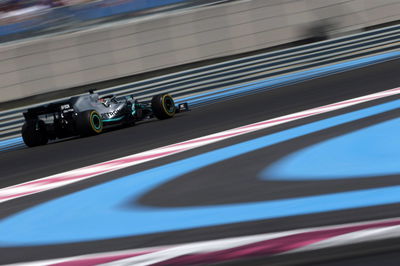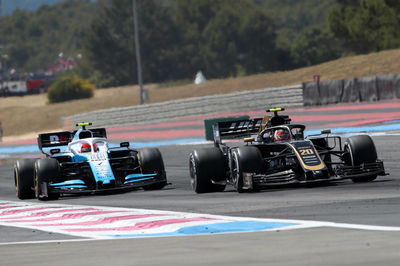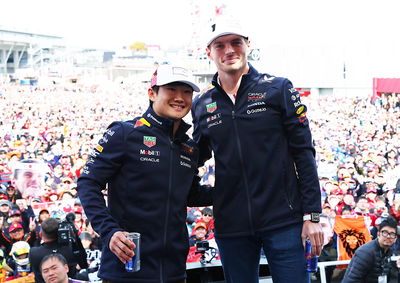Hamilton stands up to become F1’s voice of reason
In the aftermath of Lewis Hamilton’s dominant victory in Sunday’s French Grand Prix that extended his championship lead and saw him edge ever-closer to Michael Schumacher’s all-time wins record, you would have forgiven the Mercedes driver for a little self-indulgence.
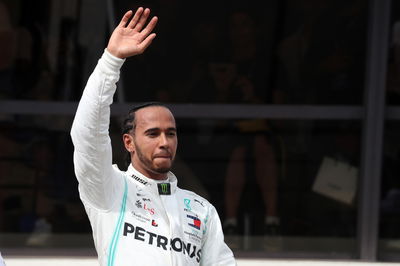
In the aftermath of Lewis Hamilton’s dominant victory in Sunday’s French Grand Prix that extended his championship lead and saw him edge ever-closer to Michael Schumacher’s all-time wins record, you would have forgiven the Mercedes driver for a little self-indulgence.
A sixth win in the last seven races saw him move into a 36-point lead at the head of the drivers’ standings, with more than 70 standing between him and Ferrari rival Sebastian Vettel. The early-season spark from Valtteri Bottas appears to have dimmed. For many, this title race is over with barely a third of the season done.
But Hamilton’s thoughts after the race did not centre on his own success. Instead, it was the state of Formula 1 as a whole following one of the most processional races in recent memory.
With the exception of the four-car scrap for seventh place on the final lap, the French Grand Prix was a dull, turgid affair devoid of any real action or excitement. Put down to a mix of Paul Ricard’s layout, the performance gaps between the teams and – most crucially – the obvious strategy option that offered little deviation, this was a race quickly decried as one of the worst in F1 history.
It again put the spotlight on the need for radical change in the sport. Plans for 2021 and the promised revolution continue to be formulated in the background, with the latest set of meetings resulting in an agreement to postpone finalising the regulations until the end of October.
But 2021 is still a long way away. Before we get there, we risk sitting through another 34 races similar to the one that unfolded on Sunday. And what if the revolution falls flat, much as shake-ups of the regulations for both 2017 and this season failed to change the colour of the team featuring most regularly at the top step of the podium?
These are all legitimate fears F1 fans hold and shared in the aftermath of Sunday’s race at Paul Ricard – yet few of the drivers stood up and spoke about it with the same kind of unease. Most repeated the same old issue of “you can’t follow with these cars” (remember that’s what the rules this year were meant to fix) and said the racing would be better if they removed the chicane in the middle of the Mistral Straight.
But Lewis Hamilton, as he has done throughout his F1 career, broke the mould and swam against the tide. He stood up and made the issues facing the sport plainly clear when speaking in the post-race press conference with no holds barred.
“Don’t point the fingers at the drivers because we don’t write the rules,” Hamilton said. “We have nothing to do with the money shifting, all that kind of stuff. We should put the pressure on the people that are at the head, who should be doing the job. I think they are trying to but for many, many years they’ve made bad decisions.
“Do I have confidence that it’s going to shift massively? I have faith that it’s going to get better. I really, really hope so, to the point that I went to Paris last week to get involved. I was in that meeting, watching all the bosses of F1.
“I have nothing to gain by it by being there but if there’s anything I can help with… They’ve been making all these decisions and never once had a driver’s input in that room, so if that can be the decisive point that helps shift it and the fans can get better racing, I will be proud to be a part of that.”
Hamilton may have joked before about his advancing age compared to his peers in recent years – even saying in Abu Dhabi last year he was most glad for Robert Kubica’s comeback as it meant he remained only the third-oldest driver on the grid – but his role as one of F1’s ‘elder statesmen’ charged with helping tackle the big issues is something he is increasingly aware of.
He knows he isn’t going to be racing in another 10 years’ time. Everything we’ve heard from Lewis so far suggests he’ll be moving on to other ventures like fashion and music once he’s done racing. But he wants to ensure the sport that has made his life so full is left in good health when the time comes to hang up his helmet.
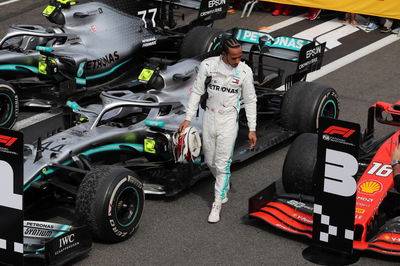
Hamilton was one of just two current drivers to attend the meeting in Paris earlier this month where the future of F1 was discussed at length, the other being Renault’s Nico Hulkenberg. The Grand Prix Drivers’ Association was also represented by Alexander Wurz, but the other 18 racers on the grid did not go there in person.
Why not? Kimi Raikkonen on Thursday said it would have been “fucking pointless” for all of the drivers to go along as there was representation from the GPDA, with the Finn sceptical of his input having any real influence on the future.
“We’ve all seen what happens with the rules,” Raikkonen said. “The teams have to agree on them, and it’s unlikely all teams will agree on everything. I think it always starts from there because everybody has some things they want to gain on. It’s very hard to believe that will suddenly change and they agree on anything.”
But if such cynicism was shared by the entire grid, there would be zero chance of the drivers’ input being valued or recognised. For Hamilton – by far F1’s most visible figure – to take such a stand is crucial to not only fixing the issues the sport faces, but also highlighting them to the wider world - it goes beyond a few grumbles here and there.
F1 managing director Ross Brawn expressed his delight at Hamilton’s desire to get involved in shaping the sport’s future direction when speaking in his regular post-race debrief.
“I'm happy Lewis has confirmed his willingness to make his own contribution in the coming months, and we can't wait to work with him, particularly in each of the three meetings now scheduled,” Brawn said.
"We know well that Formula 1 needs to make an important change in direction if it wants to maintain its position as one of the most followed sporting spectacles in the world.
"All of the key stakeholders - ourselves, the FIA and the teams - agree on the objectives and there is broad agreement on the major principles, such as the introduction of the budget cap and a fairer distribution of the revenue, while on the technical aspects we, and the FIA, have worked together with engineers from all the teams. It will be great to have an input directly from the drivers.”
F1 has long been aware of Lewis Hamilton’s significance on a global level as he reaches beyond the sport’s regular confines thanks to his celebrity status.
But as we speed towards 2021, it looks like he is going to be a vital and sorely needed voice of reason.
